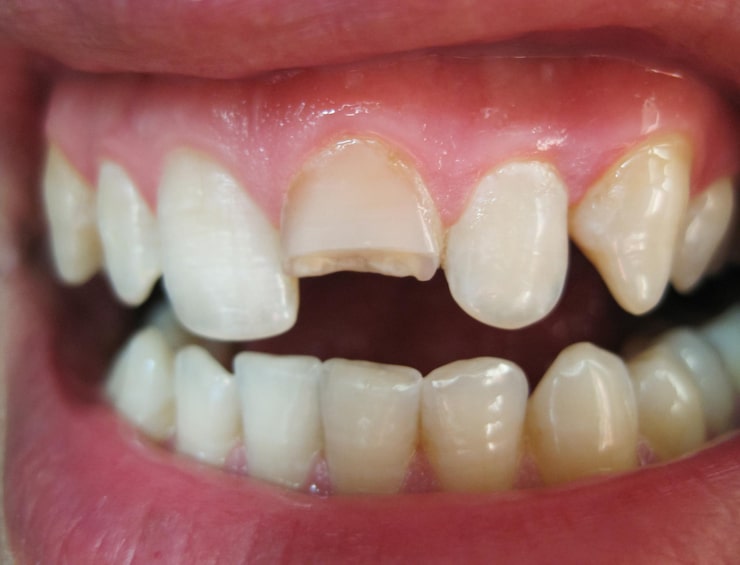
Have you ever wondered why some people seem to have teeth that crack or break more easily than others? While poor oral hygiene and accidents are common culprits, several underlying medical conditions can significantly weaken your teeth, making them prone to fractures and breakage. Understanding these conditions is crucial for maintaining optimal oral health and knowing when to seek professional help.
When teeth break unexpectedly or frequently, it’s often a sign that something more serious is happening beneath the surface. Let’s explore the various illnesses and medical conditions that can compromise your dental health and learn how to protect your smile.
Primary Medical Conditions That Cause Tooth Breakage
Autoimmune Disorders
Sjögren’s Syndrome stands out as one of the most significant autoimmune conditions affecting dental health. This disorder attacks the glands responsible for producing saliva and tears, leading to severe dry mouth (xerostomia).
Impact on Teeth:
- Reduced saliva production eliminates natural tooth protection
- Increased bacterial growth leads to rapid decay
- Loss of remineralization process weakens tooth structure
- Higher risk of cavities and subsequent tooth fractures
Rheumatoid Arthritis also plays a role in dental health deterioration. The chronic inflammation associated with this condition can affect the supporting structures of teeth and increase the risk of periodontal disease.
Eating Disorders
Eating disorders have devastating effects on dental health, with bulimia nervosa being particularly destructive to tooth enamel.
How Eating Disorders Damage Teeth:
- Frequent vomiting exposes teeth to stomach acid (pH 1.5-2.0)
- Acid erosion dissolves tooth enamel over time
- Weakened enamel becomes prone to chipping and breaking
- Nutritional deficiencies affect tooth structure and healing
| Eating Disorder | Primary Dental Impact | Breakage Risk Level |
|---|---|---|
| Bulimia Nervosa | Severe acid erosion | Very High |
| Anorexia Nervosa | Nutritional deficiency | High |
| Binge Eating | Sugar exposure, poor hygiene | Moderate |
Gastroesophageal Reflux Disease (GERD)
GERD is often an overlooked cause of dental problems. The condition causes stomach acid to regularly flow back into the mouth, creating an acidic environment that gradually dissolves tooth enamel.
GERD’s Effect on Teeth:
- Chronic acid exposure weakens enamel structure
- Back teeth (molars) are most commonly affected
- Gradual thinning leads to increased fracture risk
- Often goes undiagnosed as a dental health factor
Diabetes and Blood Sugar Disorders
Diabetes creates a perfect storm for dental problems through multiple pathways:
Primary Mechanisms:
- High blood sugar levels promote bacterial growth
- Reduced immune function impairs healing
- Increased risk of gum disease and tooth loss
- Poor circulation affects dental tissue health
Secondary Effects:
- Frequent infections weaken tooth supporting structures
- Medications may cause dry mouth
- Slower healing after dental procedures
- Higher likelihood of dental emergencies
Genetic and Developmental Conditions
Amelogenesis Imperfecta
This rare genetic condition affects enamel formation, resulting in teeth that are:
- Abnormally thin and weak
- Discolored (yellow, brown, or gray)
- Highly susceptible to wear and breakage
- Sensitive to temperature changes
Dentinogenesis Imperfecta
Another hereditary condition that affects dentin (the layer beneath enamel):
- Teeth appear translucent or opalescent
- Extreme brittleness and frequent fractures
- Progressive wear of tooth structure
- Often requires extensive dental intervention
Medications That Weaken Teeth
Many commonly prescribed medications can indirectly cause tooth breakage by creating conditions that compromise dental health.
High-Risk Medications
| Medication Category | How It Affects Teeth | Breakage Mechanism |
|---|---|---|
| Antihistamines | Reduces saliva production | Dry mouth increases decay risk |
| Antidepressants | Causes xerostomia | Loss of natural protection |
| Blood Pressure Medications | Decreases saliva flow | Weakened enamel structure |
| Chemotherapy Drugs | Multiple oral health impacts | Direct tissue damage |
| Bisphosphonates | Affects bone metabolism | Compromised jaw bone health |
Important Note: If you’re taking any medications and experiencing dental problems, consult with a qualified dentist in Nagpur who can assess your specific situation and recommend appropriate preventive measures.
Age-Related and Hormonal Factors
Menopause and Hormonal Changes
Hormonal fluctuations during menopause can significantly impact oral health:
- Decreased estrogen affects bone density
- Reduced saliva production
- Increased gum sensitivity and recession
- Higher risk of tooth loss and fractures
Osteoporosis
This bone-weakening condition doesn’t just affect larger bones – it also impacts the jawbone that supports your teeth:
- Reduced bone density around tooth roots
- Increased risk of tooth mobility
- Higher likelihood of fractures during normal chewing
- Complications with dental procedures
Nutritional Deficiencies and Tooth Breakage
Poor nutrition plays a crucial role in dental health, with several deficiencies directly contributing to tooth weakness:
Critical Nutrients for Tooth Strength:
- Calcium: Essential for tooth mineralization
- Vitamin D: Helps calcium absorption
- Vitamin C: Necessary for gum health and collagen formation
- Phosphorus: Works with calcium to strengthen teeth
- Vitamin K2: Directs calcium to teeth and bones
Signs of Nutritional Impact on Teeth:
- Increased cavity formation
- Slow healing after dental procedures
- Gum bleeding and inflammation
- Tooth sensitivity and pain
- Premature tooth loss
Environmental and Lifestyle Factors
Chronic Stress
Stress affects dental health through multiple mechanisms:
- Teeth grinding (bruxism) during sleep
- Jaw clenching during the day
- Compromised immune system
- Poor dietary choices
- Neglected oral hygiene routines
Sleep Disorders
Sleep apnea and other sleep disorders often correlate with bruxism, leading to:
- Excessive wear on tooth surfaces
- Micro-fractures that expand over time
- Jaw muscle tension and pain
- Increased risk of major tooth breakage
When to Seek Professional Help
If you’re experiencing frequent tooth breakage or have any of the conditions mentioned above, it’s essential to work with an experienced dental professional. Forever Orthocare provides comprehensive dental care that addresses both the symptoms and underlying causes of dental fragility.
Warning Signs That Require Immediate Attention:
- Sudden increase in tooth sensitivity
- Visible cracks or chips appearing frequently
- Pain when biting or chewing
- Changes in tooth color or texture
- Loose teeth or shifting bite
Prevention Strategies for At-Risk Patients
Medical Management
Working closely with both your physician and dental clinic in Nagpur ensures comprehensive care:
- Regular monitoring of underlying conditions
- Medication adjustments when possible
- Nutritional supplementation
- Specialized dental treatments
Enhanced Oral Hygiene
Daily Care Protocol:
- Use fluoride toothpaste specifically designed for sensitive teeth
- Incorporate remineralizing mouth rinses
- Consider prescription-strength fluoride treatments
- Maintain consistent brushing and flossing routine
Protective Measures
Professional Interventions:
- Custom night guards for bruxism
- Fluoride varnish applications
- Dental sealants for high-risk areas
- Regular professional cleanings and examinations
Dietary Modifications
Tooth-Strengthening Foods:
- Dairy products rich in calcium
- Leafy greens for vitamin K
- Fish for vitamin D and omega-3s
- Nuts and seeds for healthy fats and minerals
The Importance of Regular Dental Care
Regular visits to a qualified dentist in Nagpur are crucial for early detection and management of conditions that can lead to tooth breakage. Professional dental care provides:
- Early identification of risk factors
- Customized prevention strategies
- Treatment of underlying dental issues
- Monitoring of medication effects on oral health
- Coordination with other healthcare providers
Frequently Asked Questions
1. Can diabetes really cause my teeth to break more easily?
Yes, diabetes significantly increases your risk of tooth breakage through multiple mechanisms. High blood sugar levels create an environment where harmful bacteria thrive, leading to increased decay and gum disease. Additionally, diabetes reduces your body’s ability to fight infections and heal properly, making your teeth more vulnerable to damage. Poor circulation associated with diabetes also affects the health of your gums and the supporting structures of your teeth.
2. How quickly can GERD damage my teeth?
GERD can cause noticeable tooth damage within months to a few years, depending on the severity and frequency of acid reflux episodes. The stomach acid that reaches your mouth has a pH of 1.5-2.0, which is extremely acidic and can begin dissolving tooth enamel immediately upon contact. Regular exposure, especially during sleep when saliva production is reduced, can lead to significant enamel loss and increased breakage risk relatively quickly.
3. Are certain medications more likely to cause tooth problems than others?
Yes, some medications pose higher risks to dental health. Antidepressants, antihistamines, and blood pressure medications are particularly problematic because they often cause dry mouth (xerostomia). Chemotherapy drugs can directly damage oral tissues, while bisphosphonates used for osteoporosis can affect jawbone health. If you’re taking multiple medications, your risk compounds, making regular dental monitoring even more important.
4. Can eating disorders cause permanent tooth damage?
Unfortunately, yes. The acid erosion caused by frequent vomiting in bulimia can permanently destroy tooth enamel, which doesn’t regenerate once lost. The damage often affects the inner surfaces of teeth first, making it less visible initially but progressively weakening the entire tooth structure. Early intervention and treatment of the eating disorder, combined with intensive dental care, can prevent further damage and preserve remaining tooth structure.
5. How do I know if my tooth breakage is due to an underlying medical condition?
If you’re experiencing frequent tooth breakage despite good oral hygiene, or if the breakage seems disproportionate to your lifestyle and diet, an underlying medical condition may be involved. Other warning signs include persistent dry mouth, frequent infections, slow healing, or if you have a diagnosed autoimmune condition, diabetes, or GERD. A comprehensive evaluation by both your physician and dentist can help identify potential connections.
6. Can stress really make my teeth break?
Yes, chronic stress can significantly contribute to tooth breakage through teeth grinding and jaw clenching, known as bruxism. Many people grind their teeth unconsciously during sleep or clench their jaw during stressful situations. This excessive force can create micro-fractures in teeth that eventually lead to major breaks. Stress also compromises your immune system and can lead to poor oral hygiene habits, further increasing breakage risk.
7. What should I do if I suspect a medical condition is affecting my teeth?
First, schedule an appointment with Forever Orthocare for a comprehensive dental evaluation. Be sure to provide a complete medical history, including all medications and diagnosed conditions. Your dentist may recommend coordination with your physician or specialist to address underlying causes. In the meantime, maintain excellent oral hygiene, avoid hard foods, and consider using a night guard if you suspect teeth grinding. Early intervention is key to preventing further damage and preserving your natural teeth.



